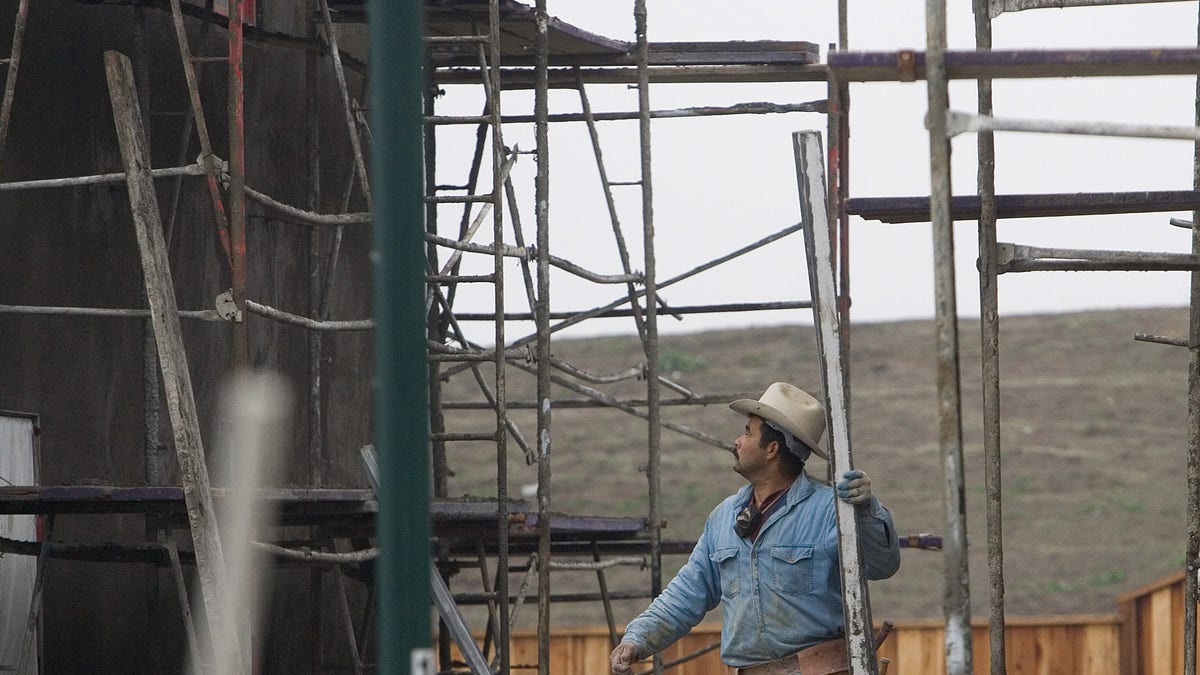
SAN RAMON, CA - DECEMBER 28: A laborer works on the construction of a new home development December 28, 2007 in San Ramon, California. The Commerce Department reported December 28 that the sales of new homes in the U.S. dropped to the lowest level in 12 years for the month of November. (Photo by David Paul Morris/Getty Images) (2007 Getty Images)
My maternal grandfather was born in 1901 to the Ovalle family and raised in the Mexican border town of Piedras Negras, just across the Texas border. He had his first job at age 10. After school and in the summer, my grandfather and his three brothers sold homemade candies, known as "leche quemada," on the town's downtown streets.
That early work experience, no doubt, played an important role throughout his life. In the mid-1920s, my grandfather moved to Texas with his new bride, learned the construction trade, and eventually started his own construction business in San Antonio.
If America is to remain competitive, innovative, and vibrant over the next century, we must recognize the growing importance of Hispanics in the nation’s labor market and must be willing to remove the tax and regulatory barriers that undermine small business formation and expansion. Would-be Hispanic entrepreneurs stand ready to succeed or fail on their own merits.
That entrepreneurial tradition has been, for many, the pathway to the American dream. But recent research suggests that occupational licensing, particularly in areas such as the construction industry, could be disproportionately affecting prospects for would-be Hispanic entrepreneurs.
The reach and impact of these state-level regulations cannot be over-stated. Take the Green sisters, ages 7 and 8, of Overton, Texas. These children recently ran afoul of Texas health code laws when they sold lemonade without the proper permit. The police chief ordered the girls to shut down the stand. While these types of laws might protect the public from "cooties," customers are probably not overly-concerned with the health risks associated with unlicensed lemonade vendors.
In the construction industry, 28 states license who can paint according to 2012 study from the Institute for Justice. In New Mexico, for example, painting is building specialty requiring two years of work experience and costing about $250 in application, testing and licensing fees. Florida and Texas do not require occupational licenses for commercial/general painters.
Indeed, it is difficult to imagine that my grandfather would have the same success if he were starting his businesses today. While there has been a growing interest in the role that Hispanics play in small business formation, little work has been done on entrepreneurial activity on the state level. Using data from the Kaufman Foundation and the Institute for Justice, as well as previous research from the Goldwater Institute, a recent analysis examines state-level occupational licensing in the construction industry.
The study focused on three states – Florida, New Mexico, and Texas – which all have significant Hispanic populations and relatively large concentrations of Hispanic-owned businesses. In 1997, these three states all had Hispanic populations that were 20 percent or more of their total populations. Hispanic-owned firms also accounted for 20 percent or more of the total firms. But these states had disparate rates of Hispanic entrepreneurial activity.
While many factors affect entrepreneurship, this new research suggests that state-level occupational licensing in the construction industry, where Hispanic workers and Hispanic-owned firms are concentrated, creates barriers to entry for Hispanics through educational requirements and/or increases the capital requirements to start a construction business and may be dampening entrepreneurial activity for would-be Hispanic entrepreneurs.
According to one recent estimate, there are now 3.2 million Hispanic-owned businesses in the U.S., comprised primarily of small businesses. In the coming decades, America’s economic growth will likely increasingly rely on Hispanics' continued contributions to the entrepreneurial economy. This is a promising trend that can continue to positively impact the nation's job growth and economic well-being.
That is why policymakers should carefully examine the utility of the government-created obstacles that increase the barriers to entry to entrepreneurship; especially those that disproportionately tend to discourage Hispanic entrepreneurship. In particular, occupational licensing should be evaluated and removed in those instances where there is no compelling public safety interest.
If America is to remain competitive, innovative, and vibrant over the next century, we must recognize the growing importance of Hispanics in the nation’s labor market and must be willing to remove the tax and regulatory barriers that undermine small business formation and expansion. Would-be Hispanic entrepreneurs stand ready to succeed or fail on their own merits. They are more than up to the task.
The spirit that motivated my grandfather to sell leche quemada in Piedras Negras and search for "La Tierra Prometida" (the Promised Land) is still alive today. The only question is whether policymakers will seek to unleash this entrepreneurial potential or continue to dampen it.
